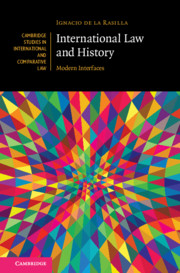Book contents
- International Law and History
- Cambridge Studies in International and Comparative Law: 152
- International Law and History
- Copyright page
- Dedication
- Epigraph
- Contents
- Acknowledgements
- Introduction
- 1 The Turn to the History of International Law
- 2 Contextual Approaches to the History of International Law
- 3 Critical/Postmodern Approaches to the History of International Law
- 4 TWAIL/Post-colonial Approaches to the History of International Law
- 5 Global Approaches to the History of International Law
- 6 Feminist Approaches to the History of International Law
- 7 Normative Approaches to the History of International Law
- 8 Sociological Approaches to the History of International Law
- 9 Institutional Approaches to the History of International Law
- 10 Biographical Approaches to the History of International Law
- 11 Multi-perspectivity and Periodization in the History of International Law
- Bibliography
- Index
- Cambridge Studies in International and Comparative Law
7 - Normative Approaches to the History of International Law
Published online by Cambridge University Press: 07 January 2021
- International Law and History
- Cambridge Studies in International and Comparative Law: 152
- International Law and History
- Copyright page
- Dedication
- Epigraph
- Contents
- Acknowledgements
- Introduction
- 1 The Turn to the History of International Law
- 2 Contextual Approaches to the History of International Law
- 3 Critical/Postmodern Approaches to the History of International Law
- 4 TWAIL/Post-colonial Approaches to the History of International Law
- 5 Global Approaches to the History of International Law
- 6 Feminist Approaches to the History of International Law
- 7 Normative Approaches to the History of International Law
- 8 Sociological Approaches to the History of International Law
- 9 Institutional Approaches to the History of International Law
- 10 Biographical Approaches to the History of International Law
- 11 Multi-perspectivity and Periodization in the History of International Law
- Bibliography
- Index
- Cambridge Studies in International and Comparative Law
Summary
International norms, principles, and legal doctrines are always present in all histories of international law. Without them, the histories being narrated would arguably appear to be instead histories of something else. However, the extent to which these juridical identifiers are the central focus of the narrative, or recede instead into the background to different degrees until they occasionally become a silent frame of reference for the historical narrative, varies greatly across different approaches. The category of normative approaches to the history of international law belongs to the history of concepts within the general categorization of the ‘modes or forms in which history’ and, by extension, the history of international law ‘may be written’. As a form of conceptual history, normative approaches are commonly recognized as the prototypical illustration of what passes as international jurists´ history. This, according to Valentina Vadi, is a form of history written by international ‘lawyers [who] tend to be interested in the past for the light it throws on the present and consider it as “a self-contained universe”, tracing the genealogy of given concepts with little if any attention to the context’. This approach is generally distinguished from that of historians whose enquiries are oriented to casting light on the past for its own sake and not for what it allegedly ‘brought about’. Being less generally informed by a juridical form of functional presentism, their scholarly work is more receptive to historical professional methods and to the reconstruction of the particular historical context, intellectual, sociological, and otherwise, relevant to their object of historical research, with acute attention, as was seen in Chapter 2, to avoiding the pitfalls of anachronism and other related historical fallacies.
- Type
- Chapter
- Information
- International Law and HistoryModern Interfaces, pp. 220 - 251Publisher: Cambridge University PressPrint publication year: 2021

